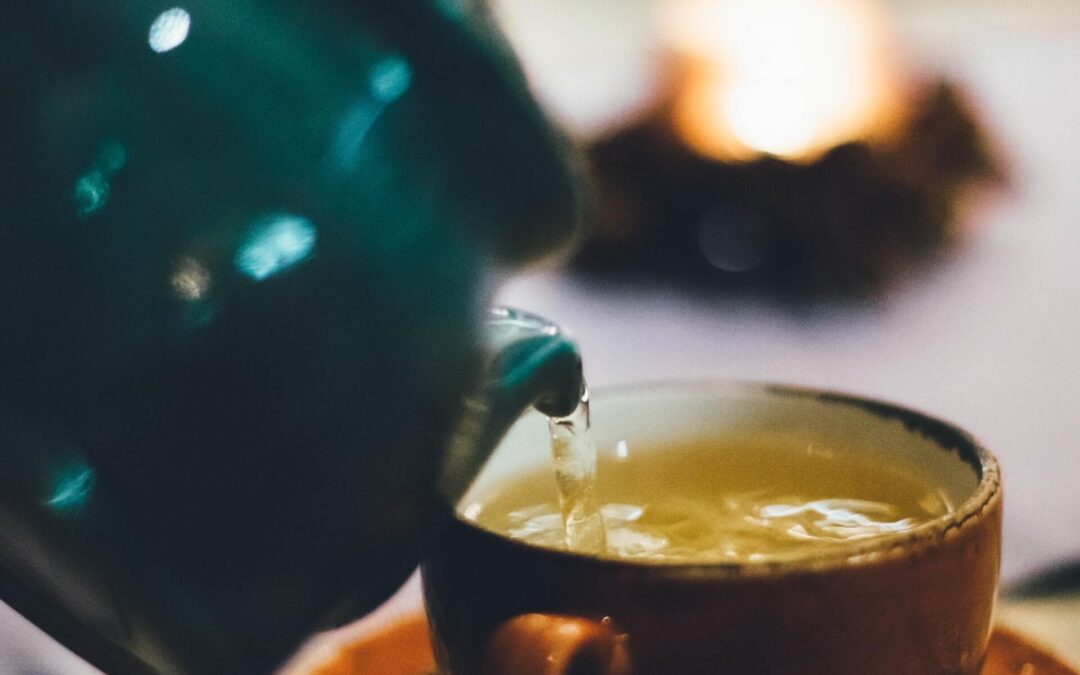L-theanine has recently become a natural chemical that promotes relaxation and improves attention under stressful situations. It is classified as a nootropic or a substance that improves mental function.
In this post, we will look at where L-theanine originates from, what benefits it may have for your brain, and what disadvantages it may have.
What is L-Theanine?
If you drink tea, you’re probably already familiar with L-theanine.
L-theanine, often known as theanine, is an amino acid that exists naturally in just two species: Camellia sinensis (tea plant) and Bay Bolete mushrooms (1).
Japanese scientists identified it in green tea leaves in the 1940s, and it was later discovered to occur naturally in all Camellia sinensis teas (white, green, oolong, and black teas) (2).
Scientists have isolated L-theanine from tea and made it accessible as a standalone supplement.
How L-Theanine Works
L-theanine has four significant impacts on the brain, making it a potent ally for mental performance and wellbeing.
L-theanine Increases GABA and Other Neurotransmitters in Your Brain
Gamma-aminobutyric acid (GABA) is an inhibitory neurotransmitter that regulates anxiety, reduces inflammation, and promotes sleep.
L-theanine boosts GABA synthesis as well as the neurotransmitters serotonin and dopamine. These neurotransmitters regulate emotions, mood, and sleep (3, 4).
Increased amounts of these soothing brain chemicals help you relax, sleep better, and cope more effectively.
L-theanine Lowers Excitatory Neurotransmitters
Glutamate, or glutamic acid, is the brain’s most significant excitatory neurotransmitter. It is elevated during stress and anxiety reactions, and it may potentially exacerbate symptoms of mental diseases (5).
L-theanine, which has a similar structure to glutamate, can prevent glutamate from attaching to glutamate receptors, which would otherwise cause stress and anxiety.
Furthermore, L-theanine is inhibitory — that is, it might offer an opposite, calming action that reduces anxiety (6).
According to research, L-theanine can lower excitatory brain chemicals and potentially protect brain cells against stress and aging (7).
Increases Alpha Brain Waves
The electrical activity in your brain is recorded in cycles per second or hertz (Hz) via brain waves. They generally vary between 1-100 Hz (8).
Alpha brain waves, which range from 7 to 13 hertz, suggest a state of conscious relaxation or “calm focus.” This is the mode in which ideas flow freely and creativity soars–think of this as a contemplative or flow state.
Several clinical experiments on both high-anxiety and low-anxiety test participants indicated that L-theanine supplementation boosted alpha brain waves within 30 minutes of treatment, aiding in the relaxation of both groups (9).
The strength of alpha waves was also shown to be dose-dependent, according to the researchers. In other words, the more L-theanine was given to the test individuals, the more relaxed they were (10).
Antioxidant Effects
Tea already contains flavonoids and catechin antioxidants such as EGCG, but did you know L-theanine is also an antioxidant? (11)
According to research, L-theanine can boost antioxidant activity in the brain and minimize inflammatory chemical damage.
What is L-Theanine Used For?
L-Theanine Fights Stress and Anxiety
L-theanine reduces stress and anxiety without causing excessive sleepiness or impairing motor function.
According to research, taking L-theanine supplements can help avoid the abrupt blood pressure and heart rate spike that people generally experience during stress (12).
According to a review of clinical research, L-theanine can also help lower stress levels under highly stressful conditions. It is currently unknown if ingesting L-theanine on a long-term basis has any long-term impacts. People who are anxious or stressed out may benefit the most from taking L-theanine (13).
L-Theanine Boosts Cognitive Function and Protects Brain Cells
Stress, anxiety, and cognition are all strongly linked. Stress impacts decision-making capacity and can also harm brain cells (14).
According to recent research, L-theanine can promote cognitive function and increase focus due to its stress-relieving and neuroprotective properties (15).
In already anxious persons, L-theanine may immediately enhance cognitive function by improving measures of attention span and decreasing response time (16).
L-theanine can boost attention and alertness when paired with coffee while keeping the brain calm (17).
According to one study, adding 250 mg of L-theanine and 150 mg of caffeine enhanced response time, accelerated working memory reaction time, increased accuracy, increased alertness, and decreased headaches and weariness (18).
L-theanine may have therapeutic promise in neurodegenerative illnesses such as Parkinson’s and Alzheimer’s. It protects the brain by functioning as an antioxidant, anti-inflammatory, increasing dopamine availability and reducing glutamate toxicity (19, 20).
L-Theanine May Reduce the Risk of Stroke
L-theanine possesses characteristics that may help prevent and minimize the damage caused by strokes.
A stroke happens when blood flow to the brain is interrupted, resulting in the death of brain cells. Strokes can be ischemic (caused by a lack of blood flow) or hemorrhagic (caused by bleeding).
L-theanine can stimulate nitric oxide synthesis in cells. Nitric oxide is necessary to relax your arteries and allow blood flow. It is also beneficial in decreasing blood pressure, which lowers the risk of stroke (21, 22).
Animal studies have also shown that consuming L-theanine twelve hours after a stroke may preserve brain cells and reduce brain damage (23).
L-Theanine May Improve Immune Function
L-theanine may help boost the innate immune response by allowing the body to respond swiftly to previously encountered infections. In other words, a speedier immune response allows your body to fight against diseases more effectively (24).
In one cell investigation, L-theanine was observed to attenuate inflammation and oxidative stress during an asthma response (25).
L-Theanine Increases Sleep Quality
Although L-theanine does not have sedative qualities, it can aid sleep, particularly if you suffer from anxiety.
In one study, scientists observed that taking large quantities of L-theanine regularly helped those with anxiety sleep better (26).
In other studies, L-theanine has been shown to improve sleep in seniors, young boys with attention deficit hyperactivity disorder (ADHD), and adults with severe depressive disorder compared to a placebo (27, 28, 29).
Is L-Theanine Safe?
The FDA considers L-theanine safe at a daily dose of up to 1,200 mg (30).
There have been few reports of L-theanine adverse effects. However, one research found that it may exacerbate headaches (31).
Adverse effects are possible if you acquire your L-theanine from tea. Tea consumption is associated with gastrointestinal discomfort, diarrhea, and indigestion (32).
Because of its blood pressure-lowering properties, those with low blood pressure should exercise caution when using L-theanine.
However, you should always see your doctor before beginning a new supplement, especially if you are pregnant, nursing, using medication, or have a medical condition.
L-Theanine Interactions with Other Drugs
Although L-theanine is typically harmless, it can interact with some pharmaceuticals and treatments.
The most well-known L-theanine interaction is the combination of L-theanine with caffeine. It reduces the unpleasant effects of caffeine, such as jitters and anxiety, caused by caffeinated drinks and dietary supplements such as coffee, matcha, and guarana (33).
This might explain why some people mix L-theanine with caffeine to concentrate for extended periods, mainly while working on cognitively demanding activities (34).
L-theanine’s inhibitory effects on nicotine may also apply. Animal research discovered that L-theanine supplementation reduced the “dopamine reward” associated with nicotine use (35).
L-theanine’s interactions are not entirely inhibitory. L-theanine has been shown to boost the action of chemotherapeutic drugs such as doxorubicin (DOX), adriamycin, and idarubicin (36).
People who use supplements or high blood pressure drugs should exercise caution while using L-theanine because it lowers blood pressure.
To be cautious, check supplements for potential interactions and consult with your healthcare professional before beginning a new supplement regimen.
L-Theanine Safe Dosage Recommendations
There is currently no specific dose of L-theanine that people should consume to get the advantages.
Most research demonstrates that taking 100-200 mg of L-theanine as a supplement once or twice a day is sufficient to reap advantages; however, a few studies have utilized as much as 900 mg per day (37, 38).
As you may know, tea is one of the few natural sources of L-theanine. High-quality tea has around 1-2% l-theanine by weight. Thus, a cup of tea made using a 3-gram heaping teaspoon of tea leaves should provide about 30-60 milligrams of l-theanine per serving (39, 40).
Drink 3-6 cups of tea daily to get the required dose of L-theanine.
Getting the whole spectrum of health advantages from L-theanine is feasible by drinking 3-6 cups of tea daily, but taking it as a supplement may be easier.
Because there is no standard amount for L-theanine, you may need to experiment with various dosages to determine what works best for you. Consult a certified healthcare provider as well.
Summary: Is L-Theanine For You?
The overwhelming number of studies confirming L-theanine’s efficiency for creating “relaxed focus” has made it one of the most popular nootropics and safest.
L-theanine’s ability to increase the neurotransmitter GABA, enhance alpha brain waves, and decrease excitatory brain chemicals makes it an exciting option for anti-anxiety medicine, and it calms you without making you tired.
L-theanine can protect brain cells, increase sleep quality, promote heart health, and reduce relaxation and stress.
To get the most out of this beneficial component, look for a high-quality supplement, such as our Keto Nootropic with MCTs, and combine it with your daily coffee for maximum focus.
L-theanine is absolutely worth a try, whether you are a biohacker or simply seeking a natural relaxing method.
FAQ
What is L-theanine best for?
L-theanine is ideal for reducing stress and anxiety, improving sleep quality, and protecting the brain from inflammation and damage.
Can I take L-theanine daily?
Most people can safely consume L-theanine daily as long as a daily dose of 1,200 mg is not surpassed through supplement and tea consumption.
Is it safe to take L-theanine with other supplements?
L-theanine can be used safely with other supplements. However, it is crucial to verify how these supplements work. For example, it may reduce the stimulant action of caffeine-containing supplements (while increasing attention), yet it boosts the activity of blood pressure supplements.







0 Comments